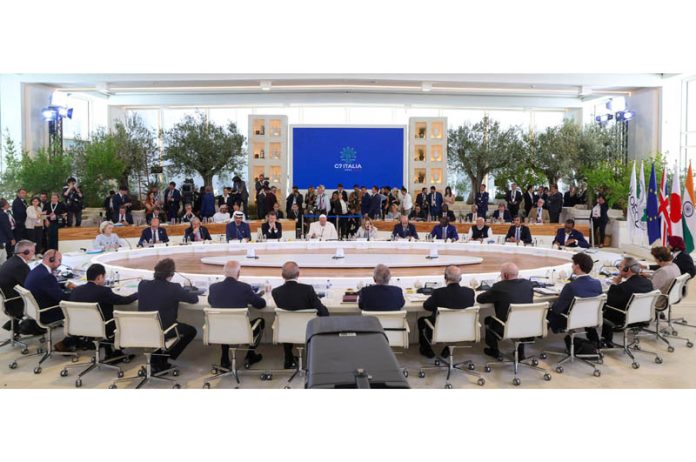
The G7 summit, traditionally a gathering of the world’s most advanced economies, has increasingly recognised the need to engage with emerging powers. This shift is evident in the inclusion of India, a testament to its rising global influence and the adept diplomacy of Prime Minister Narendra Modi. As Modi addressed the outreach session of the G7 summit in Italy’s Apulia region, his remarks underscored India’s critical role in shaping global policies, especially in technology, energy, and equitable development. Prime Minister Modi’s address at the G7 summit calls for democratising technology. In an era dominated by a handful of technological giants, Modi’s insistence on ending monopolies in technology and ensuring its equitable access is both timely and revolutionary. His articulation of a human-centric approach to technology highlights India’s commitment to using technological advancements to benefit all sections of society, particularly the underprivileged. India’s AI Mission, launched under Modi’s leadership, is a pioneering initiative aimed at promoting “AI for All.” As a founding member and lead chair of the Global Partnership on AI, India is driving international cooperation to make AI transparent, fair, secure, and accessible. Modi’s emphasis on creating technology that is inclusive and creative, rather than destructive, sets a framework for future technological developments to be aligned with human values and societal benefits.
PM Modi’s vision extends beyond digital technology to the realms of energy and environmental sustainability. His approach to energy, guided by the principles of availability, accessibility, affordability, and acceptability, ensures that energy solutions are sustainable and equitable. This balanced approach is critical as the world grapples with the dual challenges of energy security and climate change. The Mission LiFE (Lifestyle for Environment) initiative, with its global tree plantation campaign “Plant4Mother,” is a call to action for collective environmental stewardship. Modi’s commitment to achieving net zero emissions by 2070 and his advocacy for a green era underscore India’s leadership in the global environmental agenda. This vision is particularly significant as it aligns economic development with environmental sustainability, ensuring a holistic approach to growth.
A cornerstone of Modi’s address is the emphasis on the challenges faced by the Global South. These nations often find themselves disproportionately affected by global economic and political instability. India’s role in advocating for the priorities and concerns of these countries, particularly in Africa, is a reflection of its commitment to global equity and justice. The inclusion of the African Union as a permanent member of the G20, facilitated under India’s chairmanship, is a landmark achievement. It signifies a broader, more inclusive approach to global governance, one that recognises the importance of diverse voices and perspectives in shaping international policies. PM Modi’s pride in this achievement highlights India’s role as a bridge between the developed and developing worlds, advocating for a more balanced and equitable global order.
PM Modi’s engagements with global leaders at the G7 summit further underscore India’s strategic importance on the world stage. His meeting with French President Emmanuel Macron, marked by discussions on defence, nuclear energy, and space, exemplifies the robust India-France partnership. Macron’s praise for Modi’s initiative on AI during India’s G20 presidency reflects the alignment of both nations on technological and digital cooperation. Similarly, Modi’s dialogue with British Prime Minister Rishi Sunak emphasised the deepening of the India-UK Comprehensive Strategic Partnership. The progress in Free Trade Agreement negotiations and the exploration of new avenues for collaboration in sectors like semiconductors and technology are indicative of the dynamic and forward-looking nature of this bilateral relationship.
PM Modi’s meeting with Ukrainian President Volodymyr Zelenskyy was particularly noteworthy in the context of ongoing global conflicts. Modi’s reiteration of India’s stance on resolving conflicts through dialogue and diplomacy, coupled with a human-centric approach, highlights India’s role as a proponent of peace and stability. This approach is not only pragmatic but also reflective of India’s broader diplomatic philosophy of fostering constructive engagement and cooperation. In the tumultuous landscape of global politics, the Ukraine-Russia war stands as one of the most significant and challenging conflicts of recent times. Amidst this crisis, India has emerged as a pivotal player, demonstrating diplomatic finesse and strategic balance. India’s efforts to navigate the complex dynamics of the war have been nothing short of Herculean. India’s approach is holistic and practical, with no bias towards any party.
India’s contribution to the G7, under Modi’s leadership, is a testament to its rising stature on the global stage. As the world navigates complex challenges, India’s voice, advocating for equitable access to technology, sustainable development, and inclusive growth, is more critical than ever. PM’s efforts in steering India towards a leadership role in global governance highlight the country’s potential to be a force for positive change in the international arena. As the world grapples with rapid technological changes and pressing environmental challenges, PM Modi’s call to action serves as a timely reminder of the need for collective effort and shared responsibility. By fostering cooperation and ensuring equitable access to technology, the world can build a future that is not only innovative but also just and inclusive for all.

